The Electronic Intifada 21 August 2006
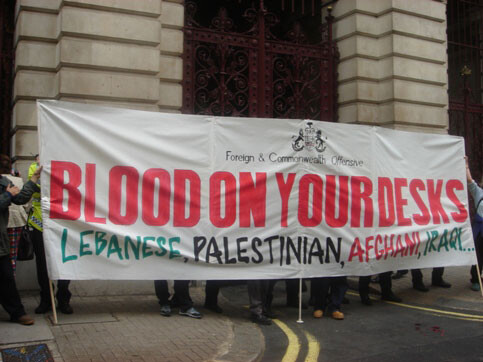
Palestinians, Lebanese, Iraqis, and Afghanis continue to be killed as a direct result of UK foreign policy. We will not stand as passive spectators to such crimes. We must do more than state-sanctioned marches.
These sentiments were the common thread that tied over 50 anti-war activists together as they stood arm in arm in a solid and strong blockade of the UK Foreign and Commonwealth Office for two hours on Monday morning. The Foreign Office was targeted as a department that is entirely complicit in the ongoing wars, occupations and injustice abroad.
At 8am activists arrived at the Foreign Office and unravelled an enormous banner that spanned the width of the road and impressively dominated the blockade. For the next two hours activists collectively blocked the entrance to the Foreign Office on Whitehall. The banner relayed a clear message to those attempting to enter their offices: “You Have Blood On Your Desks.”
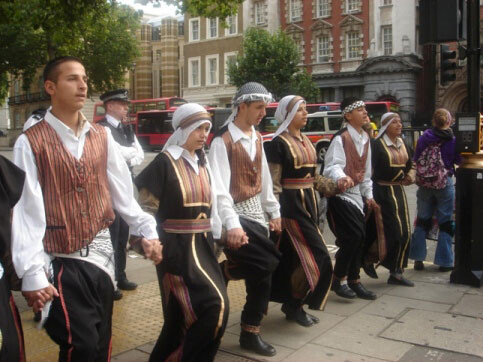
All images: Mary Nazzal-Batayneh
A Palestinian dance troupe from the Balata refugee camp gracefully performed their dramatic folkloric dance, unphased by the steadily increasing police presence around the blockade. Their dignified presence strengthened the resolve to remain steadfast as the police warned several activists that their actions were illegal under the Serious Organised Crime Act and issued official warnings. Spirits were not dampened, as one activist explained, “Those of us who are not dispossessed and not living under occupation have a moral duty to fight for those who are.”
Likewise the echoing drums of a samba band kept spirits soaring and ensured that the government officials peering through their windows could not start their day’s work. While civil servants on the bikes snaked their way around the blockade, delivery vans and other vehicles were forced to turn back. Passers by and civil servants were handed leaflets explaining the urgent message of protest and resistance. The police stood around passively, while the activists commanded the space.
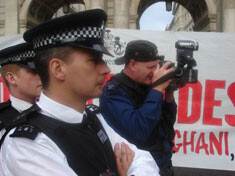
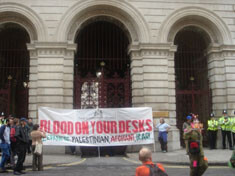
At around 9am truckloads of barricades arrived: workmen constructed a small penned, empty circle, away from the activists who, resisting getting penned in, had collectively and calmly shifted to the opposite side. They then moved on to build more barricades on this side, but these were frequently re-opened by the activists. The group was self-organising, efficient, and having reached consensus, decided to march slowly down King Charles Street with the impressive banner held high. In minutes the front door of the Foreign Office was blocked as individuals stood arm in arm in an uncompromising blockade. Despite the fact that many activists were unfamiliar to each other, the vibe was positive, protective, and calm.
Clowns of the highest calibre transformed the cobbled side street into their stage, and dramatised issues of war, death, and destruction. However, they awoke from their staged deaths only to find that the police had decided to prey on them and arrest them for spilling drops of fake blood. Although easily removable with a spot of water, the police claimed that they had caused ‘criminal damage’.
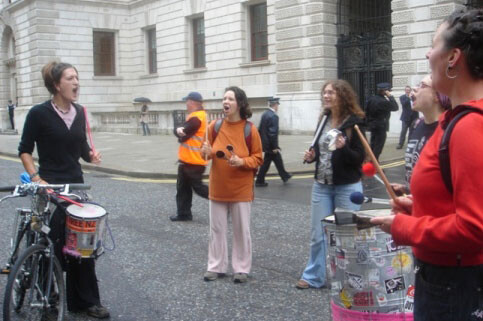
Legal advisers and medics were close at hand as the police became increasingly agitated at the obvious disturbance being caused. Apparently, the police had noted over 40 offences. Their frustration translated into some odd and aggressive behaviour including rough shoving, elbowing, and the occasional grope on a fellow activist’s “Special Area”.
Notwithstanding police attempts to intimidate the human blockade, activists took an independent and collective decision to end the blockade on their own terms, after an agreed period of time.
This was not to be however as the police, inavoidably affronted by the group’s ability to take and maintain control of the situation, had decided to reassert their dented authority by preventing the group from leaving. At this point, in addition to the clowns, another protestor was arrested as he sat on the pavement.
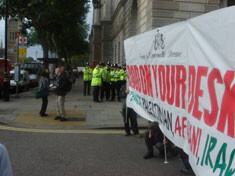
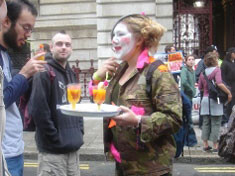
As telephone calls were made immediately to legal support networks, there was an implicit understanding amongst the group that such acts were simply attempts by the police to re-assert their control and dominance. Surrounded by police a group meeting was swiftly convened during which it was decided that a volunteer liaison should approach the police. She was informed that alleged breaches of the peace had been committed and that those still present at the protest would be able to leave in due course providing no other breaches would take place. Since the group had collectively decided to end the protest beforehand anyway, this did not pose any difficulty.
After a short while, all the protestors marched in solidarity out of King’s Charles Street. They were given a royal escort by the police through St James’ Park, and beyond. A de-brief meeting was then held where everyone had a chance to voice their views on the day’s events. The overall attitude was confident and positive, and deeply hopeful that this event produced a momentum which can only grow, inspiring many others to join in future actions with equal levels of organisation, enthusiasm and imagination.
Mary Nazzal-Batayneh regularly contributes to EI from London.
Related Links



